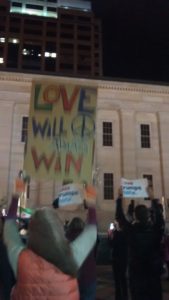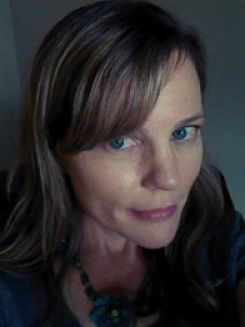Notes from the Daughter of a True Believer
The many voices are taking over the mono-voice. For fuck’s sake, let them.
~Lidia Yuknavitch, December 2015, speaking at AULA
I was raised under the prism of an American myth.

The author’s sister, left. Photo: Betty Tinker
My father taught me what it meant to be American. He was an officer in the United States Navy, and his mission took us to nine different military bases over the course of my childhood, from Guam to San Francisco to Nagasaki Prefecture, Japan. The Navy shaped my childhood, from the cross-global moves when my father received orders, to the everyday rituals of life on base. The national anthem played before every movie in the base theater. On the screen, rockets tore into space and tanks rumbled and uniformed fathers kissed their babies, while everyone in the theater stood at attention. If I happened to be outside at twilight, I knew to place my hand over my heart and freeze while the sound of a lonely trumpet rang out taps as the shadows fell. My mother timed her life around the ironing of my father’s uniforms. My father wore the stars and stripes of military insignia over his heart.
My father believed that, with the Constitution as our guide, the United States had achieved an apex of liberty and possibility for everyone. He taught me about freedom of speech, freedom of the press, the right to assembly, and the right to dissent. Going against the grain of many of his uniformed peers, he scorned the phrase, “Love it or leave it,” and defended flag-burning as a form of protected speech. It’s possible that his opinions even cost him promotions. To my father, free speech, including dissent, was essential to liberty. Dissent nipped at the heels of the nation, urging her to be her best self. When my father put his life on the line, the right to criticize the country and its leaders was among the most precious of the privileges he bound himself to protect. It took me a long time to understand that the Constitution is a kind of narrative, broadened or limited by the scope of the imaginations of those who wield the power to interpret it; that American liberty is an open-ended conversation.
* * *
In 1989, my father received orders to Oakland Army Base. We were housed in Ft. Mason in San Francisco, in a circle of standard base-housing duplexes nestled between the Marina District and Ghirardelli Square. I was fifteen and had the freedom to explore the city. My high school was in the Haight, and I rode the bus everywhere, spent hours with friends in cafes in the Mission and the Castro, in Green Apple Bookstore on Clement Street. The city was the opposite of the regimented cloister of a military base, where uniforms are worn and the buildings all look the same. In San Francisco, there were many voices, a multiplicitous community. Sitting with friends in Cafe Macondo, the “communist cafe” at 16th and Guerrero in the Mission District, years before the Silicon Valley invasion, I was exposed to critiques of American capitalism that upended everything. The Horatio Alger worldview that permeated my father’s teachings gave way to a story where institutionalized privilege and oppression were as undeniable as the homeless camps in front of San Francisco City Hall.
* * *
When they wrote that all men are created equal, the writers of the Declaration of Independence were, of course, limited in their vision. They used the word “men” not as a careless euphemism for personhood but as an exclusive category, a tight box that only had room for white, male property owners. In contrast, my father taught me that the concepts of liberty and equality have the capacity to exponentially expand, to embrace a continually widening definition of human rights. This idea of an ever-expanding potential allowed me to reconcile my father’s patriotism with the systems of institutionalized oppression I began to recognize all around me as a young woman in San Francisco. The tenuous thread that held together these two worldviews was the hope that our governing documents still contained possibility, that America was a painful work in progress. But the possibility of liberty for all depends upon the narrative itself. It depends on who is telling the story.
Now, with the election of Donald Trump, the concepts of free speech, free press, and dissent—my own tenuous links to faith in American democracy—are punctured and deflate beneath me. Were they ever really there? Was this particularly American concept of freedom ever more substantial than myth, than air?
I step into another country.
* * *
Donald Trump won the electoral college vote, in effect becoming the future 45th President of the United States. Feelings of panic and suffocation are now my baseline. Trump’s potential for destruction is too long to list here. The facile tweets and repugnant appointments, the shameless harassment of women, immigrants and religious minorities, the blustering and the fanning of racist, misogynist, and xenophobic hatred and intolerance—all are, horrifically, becoming normal. At this moment in our history, like the breaking of a dam, Trump and his cronies are releasing an actual and threatened torrential assault on our liberties.
I wrote the first draft of this essay on December 8, 2016, a full month after Election Day, and the President-elect had yet to hold a press conference. As I revise this essay, he has announced that he won’t be holding a press conference until after the inauguration. (And given his capricious nature, I would add, if then.) He refuses to communicate with the press in an open forum. During his campaign, Trump banned and/or revoked press credentials from several major news outlets, including the Washington Post. He has repeatedly slammed the exercise of free speech, from his tweeted assault on the cast of Hamilton to his threat to revoke the citizenship of anyone who burns the American flag. His sickening repudiation of American liberty marches on.
Trump’s open disdain for the press, for freedom of speech and dissent, is unprecedented. As writers, we are called to attention by it. This is about narrative control. Without press access to the Executive Branch of our government, the national narrative becomes shrouded and mystified. The narrative becomes, in effect, propaganda.
Propaganda is the narrative weaponized. To use Lidia Yuknavitch’s term, the mono-voice wields the story.
* * *
I don’t see my father much these days. Although he’s no longer active duty, he continues to work overseas as a full-time contractor for the Navy. He visits twice a year to spend time with my children, his grandkids. I don’t know who my Dad voted for in this election, or if he voted at all. He has a history of abstaining when he doesn’t like either candidate. I have to admit that’s what I’m hoping for this time. However, in the days after the election, when my Facebook feed became a wail of anger, fear, and shame, my father commented, mildly, that he thought it might be good to have a businessman in office. I wrote back that I fundamentally disagreed with him about the man who’d been elected, and that I would continue to exercise my right to free speech, including dissent, just like a wise man taught me, a long time ago.
The winter holidays are approaching and I’ll be seeing my father soon. I wonder what he’ll have to say, whether we’ll find common ground about what it means to love this country. The importance of our being able to speak to one another across potential differences of opinion feels more urgent than ever. My father taught me what it meant to be an American. Now I wonder if we are living in the same country.
* * *
I was raised under the prism of an American myth. My post-election panic and suffocation are the symptoms of the fracturing of the myth, the myth of an America passed down to me by my father.
I’m okay, even relieved, for the myth to finally shatter. I had meant to break myself of it long ago, but like a strong opiate, it asserted its will, keeping me silent and still. It’s time for a re-definition of this country, a time to break the illusion of a false equality. If nothing else, this election breaks the myth irrevocably.

Post-election, Dayton, OH
A year ago at the Antioch University Los Angeles MFA residency, writer and activist Lidia Yuknavitch warned us: “If you shut out the other voices available to the story, you are performing a colonialist act.” This December, the MFA community came together again, under very different political circumstances, and found the need to speak our truth(s) is more urgent than ever. We must refuse the colonization of our American voice(s). As writers, we must not allow the incoming administration to control the narrative, to silence us. There is work to be done.
To fortify myself, I imagine the multiplicity of voices: bits of light against the nightscape falling over our country. The LGBTQ America. The feminist America. The America where Black Lives Matter. The Muslim America. Native America. The America that belongs to immigrants. The America where immigrants belong.
Dissent runs like lifeblood through the history of this nation, generations of voices and bodies who put themselves on the line to increase the capacity of American freedom, who insisted upon their right to be included in the notion of a people created equal.
The mono-voice says, this is not your country.
But we will refuse to stand still and remain silent while taps sounds a death knell over our democracy.
Our American narrative is not calcified. It remains fluid, open to definition. As long as we can speak it—write it—it remains ours to describe. We, the many voices, will continue to stretch this country to its fullest and most beautiful, inclusive capacity. You don’t need to wear a uniform to love your country, to know that your freedom is on the line.
I’ll be the daughter of a true believer standing in the dark with her hand over her heart. I’ll stand with my fellow writers and activists. Our voices, our words, are our greatest tools of dissent. Now is the time to pick them up and hold them high. We’ll make a new anthem, together.
 Melissa Benton Barker is an MFA candidate at Antioch University Los Angeles. A Navy brat and native of nowhere, she currently lives in a small Midwestern town where she spends her time imagining stories, wandering in the woods, and raising children-sometimes simultaneously! Her work appears or is forthcoming in the Manifest-station, Smokelong Quarterly, and Literary Mama. She serves as Lead Fiction Editor at Lunch Ticket.
Melissa Benton Barker is an MFA candidate at Antioch University Los Angeles. A Navy brat and native of nowhere, she currently lives in a small Midwestern town where she spends her time imagining stories, wandering in the woods, and raising children-sometimes simultaneously! Her work appears or is forthcoming in the Manifest-station, Smokelong Quarterly, and Literary Mama. She serves as Lead Fiction Editor at Lunch Ticket.





